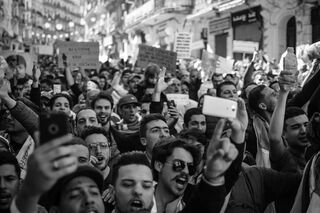Psychology
The Psychology of Mob Mentality
Is this what happened with the infiltration of the Capitol on Jan. 6?
Posted January 24, 2021 Reviewed by Ekua Hagan

Along with the world, in shock, I watched videos as the extreme right infiltrated our Capitol on Jan. 6. This day will stand in infamy as our most sacrosanct building, the symbol of our democracy, was easily penetrated, defaced and our highest government officials forced to flee for their lives.
There were mobs of people carrying Confederate flags and weapons, breaking windows, climbing into the building, calling for Representative Pelosi and Vice President Pence with the intention of doing them harm. They, thank goodness, were unsuccessful. They gained access to the Senate floor, took photos of confidential and legal government documents, repeating that they loved their country, and that they were stopping corruption.
I watched, astonished, as one member led others in prayer for God to guide them in this righteous quest. Yet, I cannot get the images of rage off their faces, hearing them yell their way into the building, watching in horror as they beat a police officer with an American flag, an assailant claiming, “Death is the only remedy” [1]. Five deaths were reported along with injuries.
This wasn’t the first time in these past four years that there have been protests that turned violent. We’ve already witnessed the violence in Charlottesville, Virginia, near the beginning of President Trump’s tenure. Then, more recently, the protests by Black Lives Matter over the senseless killing of George Floyd by the police.
A difference from other protests was that Congress had gathered to legitimize the electoral votes for our next president, and these insurgents’ goal was to install the then president for another four years. Simultaneously, the president had scheduled a rally that day, claiming that Democrats rigged the election, described how corrupt they were, urging his followers: “And we fight. We fight like hell. And if you don’t fight like hell, you’re not going to have a country anymore.” In addition to, “So we’re going to, we’re going to walk down Pennsylvania Avenue…”[2], and promptly left afterward while others marched towards the Capitol. The rest is history.
What does this have to do with “mob mentality?"
My first thought in viewing the videos was “mob mentality.” I heard this phrase for the first time in my undergraduate class in Western history. Images of unruly crowds near the Bastille during the French Revolution came to mind. This crowd, with no more to lose, resorted to violence that had accumulated over generations of poverty.
“Mob mentality,” as defined by Merriam-Webster Dictionary, is “a large and disorderly crowd of people, especially one bent on riotous or destructive action.” This definition certainly correlates with what I saw happening at the Capitol.
Causes of Mob Mentality
In order to understand this better, social psychology gives these causes [3]:
- Deindividuation—when people are part of a group, they experience a loss of self-awareness.
- Identity—when people are part of a group, they can lose their sense of individual identity.
- Emotions—being part of a group can lead to heightened emotional states, be that excitement, anger, hostility, etc.
- Acceptability—behaviours that are usually seen as unacceptable become acceptable when others in a group are seen carrying them out.
- Anonymity—people feel anonymous within a large group, which reduces their sense of responsibility and accountability.
- Diffusion of responsibility—being part of a group creates the perception that violent or unacceptable behavior is not a personal responsibility but a group one.
- The larger the group or crowd, the more likely there will be deindividuation and diffusion of responsibility.
I might also add that encouragement by a charismatic leader can exacerbate already heightened emotions for a cause, especially if it is a group that believes itself to have been forgotten by society. However, mob mentality can still occur if the group thinks it has nothing else to lose, whether or not the leader is famous.
In Summary
The causes stated above may have played out in the invasion of our Capitol.
I observed a group of mostly white people who felt that they were betrayed by their government, perhaps because of:
- The combination of unemployment and scarcity of jobs for which they were able to earn a comparable salary when manufacturers outsourced work to foreign countries in order to pay lower rates. This reality threatened not only their financial survival but also their way of life and their dignity.
- The increase of racial and gender diversity in the workplace and at different levels of government that seemed to threaten their status as the most powerful group;
- A belief fostered by the government that immigrants were taking their jobs, even though many wouldn’t accept the low pay and/or harsh work conditions; and
- Their distrust of the government to provide (even when many received) social services, i.e., Medicaid, food stamps.
My psychological training showed me that one doesn’t get involved until one is personally affected, an underbelly of individualism. We are not socialized to care for the fragile, including our elderly, the poor, the disabled. Modeled via television and social media, we are a consumer society, receiving the message that happiness and status come from external circumstances. It depends upon what neighborhoods we live in, what kinds of cars we drive, where our kids go to school, how much money we earn, and what positions we achieve climbing up the corporate ladder. Where power is equated with money, the more one group has, the more power it holds over another. And, why is that important to understand? Historically, those who have little or no money have nothing else to lose. That is the formula for “mob mentality."
And, that is what I witnessed in the violent crowd on Jan. 6, 2021.
References
1. https://www.cnn.com/videos/us/2021/01/15/capitol-riots-death-is-the-onl…
2. https://www.usnews.com/news/politics/articles/2021-01-13/transcript-of-…
3. Davies, Nicola, HealthPsychologyConsultancy, “The Psychology of Mob Mentality”, August 9, 2011.




